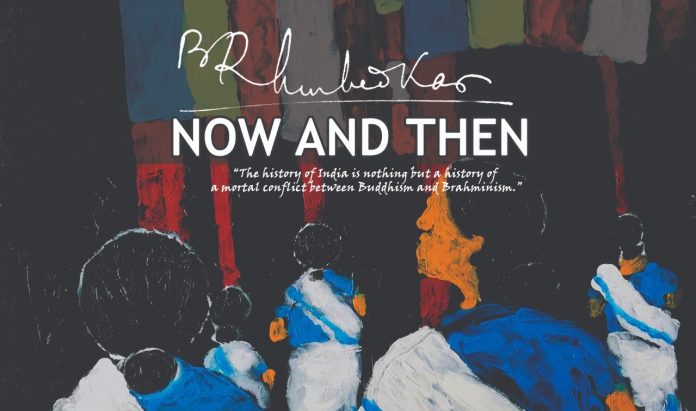By Daisy K, TwoCircles.net
How does one interpret the life and works of Dr BR Ambedkar? Who speaks for, about him, and where? What is the significance of ‘Jai Bhim’ in students’ protests across the Indian universities? What is the importance of Ambedkar’s views, analyses and opinions for today’s generation? These are the questions that filmmaker Jyoti Nisha, currently a student at the Tata Institute of Social Sciences (TISS) Mumbai, seeks to answer in her upcoming documentary: B R Ambedkar: Now and Then.
Slated to be released later this year, Jyoti’s documentary aims to look at Dr Babasaheb Ambedkar’s life, politically, and delve into the representation and assertion of Bahujan politics in today’s time. Questioning caste in India, the documentary will also include several other commentaries on religion, revolution, politics, and freedom of speech.
In a conversation with TwoCircles.net, Jyoti, who hails from an Ambedkarite family from Lucknow, talks about memories of her father who was a cadre of BAMCEF (The All India Backward and Minority Communities Employees Federation) started by Saheb Kanshiram. These early influences in her life, Jyoti says, along with readings of Ambedkar’s work at a later stage sparked the curiosity towards Ambedkar and his ideas. Starting off her professional career in journalism, Jyoti later enrolled at the Film and Television Institute of India (FTII) for a screenwriting course. She is also an alumnus of the Indian Institute of Mass Communication (IIMC), Delhi.

The beginning of 2016 marked a turning point for Jyoti, with an eruption of mass protests by students across India against the institutional murder of Rohith Vemula, a PhD Scholar at the Hyderabad Central University (HCU) by the casteist administration. In the past two years, not only has India witnessed waves of student-led protests but also an onslaught of clamping down on artists, filmmakers from marginalised communities in academic institutions, alongside a closing down of grants and scholarships for students.
An important aspect of these protests were the sounds of ‘Jai Bhim’ and the articulation of Ambedkar’s ideas by Dalit-Bahujan students.
When questioned about the documentary and what led her to embark on this project, Jyoti says, “It felt like some people had been given more power while others had been denied the same. So it became important to understand why a victim in Una or a scholar like Rohit Vemula is saying ‘Jai Bhim’.”
She says, “Like Babasaheb said, if you don’t share ideas of the people, the people also die… and during this time, there was a spurt of assertive voices in universities, media, popular music…everything was happening at the same time, and I felt it was really important to document it.” She set off on a journey to encapsulate the ideas and influence of Ambedkar on people’s lives, the different dimensions of Bahujan politics and also to break the upper-caste narrativizing and appropriation of Ambedkar’s ideas.
Jyoti initially financed the work on the documentary through her own savings along with help from her sisters. She started on the documentary around two and a half years ago. Jyoti along with cameraperson Pooja, who is a graduate of the JJ School of Arts, Mumbai, has travelled across India meeting the family of Rohith Vemula, visiting Bhima Koregaon, Saharanpur, the home of Bhim Army in Uttar Pradesh and Una in Gujarat.
B. R. Ambedkar: Now and Then has been shot across eight different states throughout India, capturing the celebrations, protests, marches, conferences, interviews, activism, all of are key parts of Bahujan culture. Speaking about the process of documentary filmmaking, Jyoti says, “filmmaking is an audiovisual medium which takes you very far because you connect it with yourself and with your politics. If you want to bring in a revolution you cannot bring it in isolation, you have to have people together, which has the feeling of community and sharing, so I thought film would be the best medium.”
Her documentary has some of the people who were associated with Ambedkar’s life including monk Pragyanand Bhante who was one of the seven monks who witnessed Ambedkar’s conversion, Bahujan activists and intellectuals from various different universities from India and abroad, activists, student leaders, lawyers, academician, musicians, and filmmakers from Bahujan background form an important part of the documentary. The background music reflects Jyoti’s own taste in music. She has used a fusion of electronic, Buddhist chants, qawwali, Punjabi folk and others.
Jyoti plans to release the documentary later this year. She has also just started a crowdfunding campaign to raise Rs 20 lakh in 60 days to cover the costs of the post-production of the documentary.


